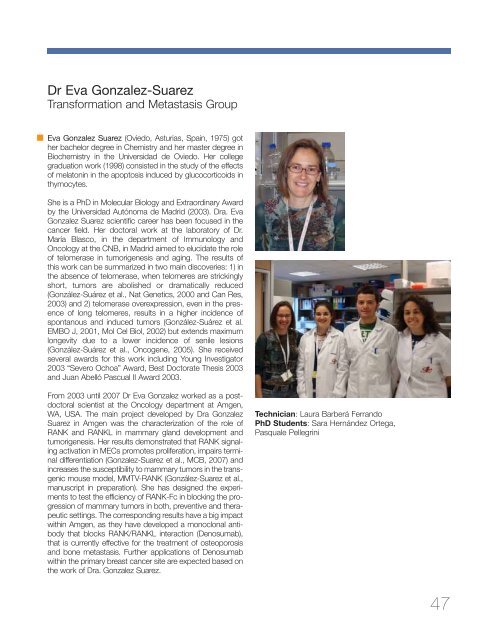PEBC Report - Programa de Epigenética y BiologÃa del Cáncer
PEBC Report - Programa de Epigenética y BiologÃa del Cáncer
PEBC Report - Programa de Epigenética y BiologÃa del Cáncer
Create successful ePaper yourself
Turn your PDF publications into a flip-book with our unique Google optimized e-Paper software.
Dr Eva Gonzalez-Suarez<br />
Transformation and Metastasis Group<br />
Eva Gonzalez Suarez (Oviedo, Asturias, Spain, 1975) got<br />
her bachelor <strong>de</strong>gree in Chemistry and her master <strong>de</strong>gree in<br />
Biochemistry in the Universidad <strong>de</strong> Oviedo. Her college<br />
graduation work (1998) consisted in the study of the effects<br />
of melatonin in the apoptosis induced by glucocorticoids in<br />
thymocytes.<br />
She is a PhD in Molecular Biology and Extraordinary Award<br />
by the Universidad Autónoma <strong>de</strong> Madrid (2003). Dra. Eva<br />
Gonzalez Suarez scientific career has been focused in the<br />
cancer field. Her doctoral work at the laboratory of Dr.<br />
María Blasco, in the <strong>de</strong>partment of Immunology and<br />
Oncology at the CNB, in Madrid aimed to elucidate the role<br />
of telomerase in tumorigenesis and aging. The results of<br />
this work can be summarized in two main discoveries: 1) in<br />
the absence of telomerase, when telomeres are strickingly<br />
short, tumors are abolished or dramatically reduced<br />
(González-Suárez et al., Nat Genetics, 2000 and Can Res,<br />
2003) and 2) telomerase overexpression, even in the presence<br />
of long telomeres, results in a higher inci<strong>de</strong>nce of<br />
spontanous and induced tumors (González-Suárez et al.<br />
EMBO J, 2001, Mol Cel Biol, 2002) but extends maximum<br />
longevity due to a lower inci<strong>de</strong>nce of senile lesions<br />
(González-Suárez et al., Oncogene, 2005). She received<br />
several awards for this work including Young Investigator<br />
2003 “Severo Ochoa” Award, Best Doctorate Thesis 2003<br />
and Juan Abelló Pascual II Award 2003.<br />
From 2003 until 2007 Dr Eva Gonzalez worked as a postdoctoral<br />
scientist at the Oncology <strong>de</strong>partment at Amgen,<br />
WA, USA. The main project <strong>de</strong>veloped by Dra Gonzalez<br />
Suarez in Amgen was the characterization of the role of<br />
RANK and RANKL in mammary gland <strong>de</strong>velopment and<br />
tumorigenesis. Her results <strong>de</strong>monstrated that RANK signaling<br />
activation in MECs promotes proliferation, impairs terminal<br />
differentiation (Gonzalez-Suarez et al., MCB, 2007) and<br />
increases the susceptibility to mammary tumors in the transgenic<br />
mouse mo<strong>de</strong>l, MMTV-RANK (González-Suarez et al.,<br />
manuscript in preparation). She has <strong>de</strong>signed the experiments<br />
to test the efficiency of RANK-Fc in blocking the progression<br />
of mammary tumors in both, preventive and therapeutic<br />
settings. The corresponding results have a big impact<br />
within Amgen, as they have <strong>de</strong>veloped a monoclonal antibody<br />
that blocks RANK/RANKL interaction (Denosumab),<br />
that is currently effective for the treatment of osteoporosis<br />
and bone metastasis. Further applications of Denosumab<br />
within the primary breast cancer site are expected based on<br />
the work of Dra. Gonzalez Suarez.<br />
Technician: Laura Barberá Ferrando<br />
PhD Stu<strong>de</strong>nts: Sara Hernán<strong>de</strong>z Ortega,<br />
Pasquale Pellegrini<br />
47


